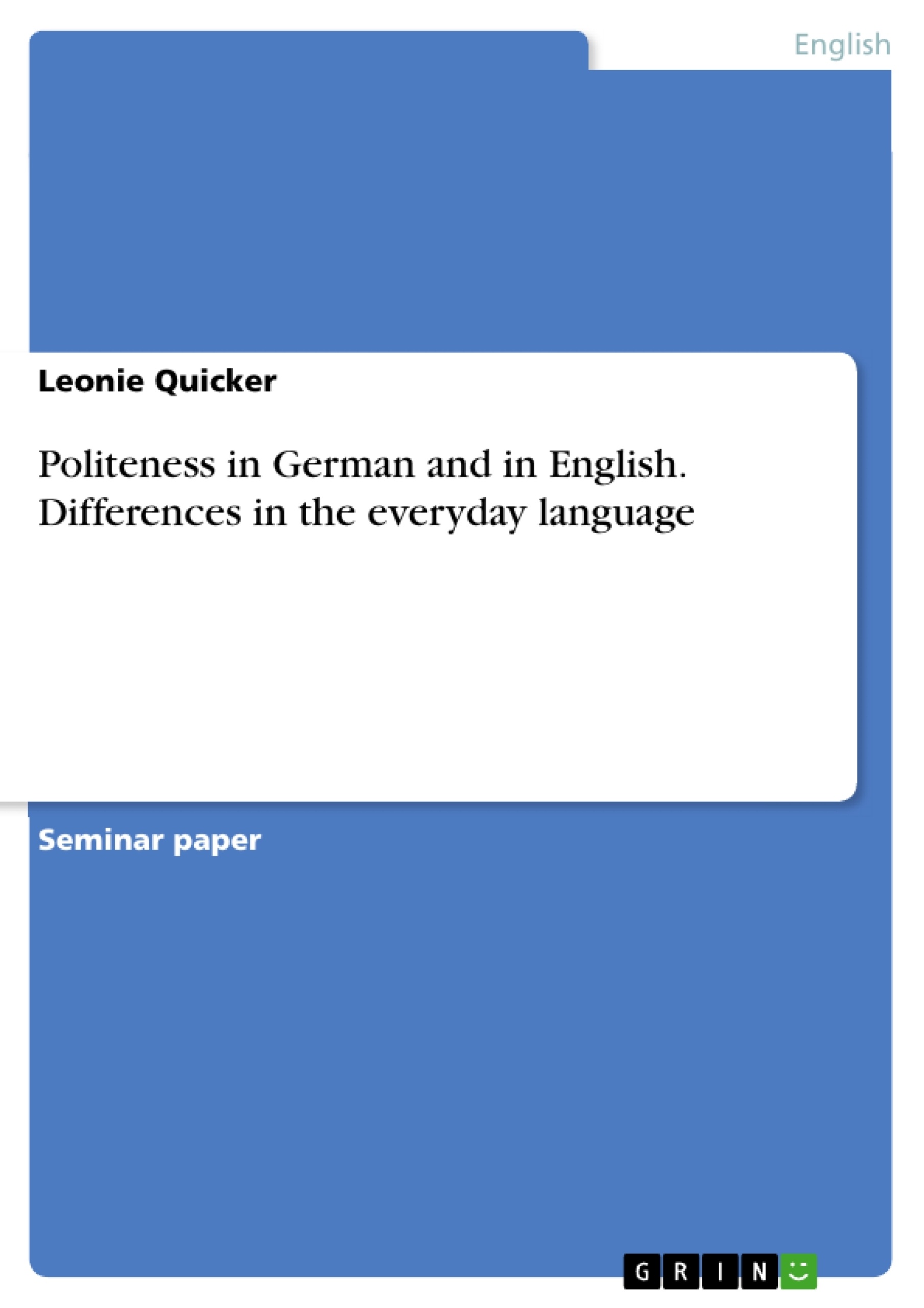In this term paper, the main differences between English and German in terms of politeness will be further explained and analysed, based on the use of the politeness markers "Bitte" and "Please". There appear to be an assumption that Germans use more often the direct and unfriendly approach while requesting something from someone, whereas English tend to indirectly ask the other person to do something by using a more formal and polite way. This possible difference may lead to problems especially for Germans while learning English, since they may appear rude without even knowing the reason. However, this term paper shall prove whether this thesis is true or not by analysing 100 samples from the English and German corpus each and comparing those results with different data and studies.
In our everyday life, we try to avoid conflicts and misunderstandings as much as we possibly can to protect our own image and the one we are talking to. However, the inevitability of such problems causes people to be excessively tactful in order to maintain a positive communication with other people. But the tactfulness may differ depending on several circumstances, for example its cultural surroundings. While it is possible to use the third singular and third plural form "you" to speak to a higher standing person in English, there is a difference in German when using "Du" and "Sie". This issue and other different aspects can lead to difficulties of intercultural communication or even by starting to learn a new foreign language. This is why this subject is important to understand in order to talk to people appropriately and accordingly, so that miscommunication can be minimized as much as possible. Even if you can speak a language perfectly, there is still a possibility that you will be misunderstood.
Inhaltsverzeichnis (Table of Contents)
- Introduction
- General definition of Politeness
- Requests
- Analysing data
- Politeness in German and English
- "Bitte" in the Corpus
- "Please" in the Corpus
- Comparing the results
- Politeness in German and English
- Cross-cultural misunderstandings
- Conclusion
Zielsetzung und Themenschwerpunkte (Objectives and Key Themes)
This term paper aims to analyze the differences between English and German in terms of politeness, focusing on the politeness markers "Bitte" and "Please". It investigates whether the assumption that Germans are more direct and less polite in their requests compared to English speakers is true. The study analyzes 100 samples from each language corpus and compares the results with existing research.
- Defining politeness and its different aspects (social politeness and tact).
- Analyzing the use of politeness markers in requests in English and German.
- Comparing the frequency of direct and indirect request strategies in both languages.
- Exploring the impact of cultural differences on politeness markers and communication.
- Investigating the potential for cross-cultural misunderstandings due to different politeness norms.
Zusammenfassung der Kapitel (Chapter Summaries)
- Introduction: This section introduces the topic of politeness and highlights the importance of understanding cultural differences in communication to avoid misunderstandings. It outlines the focus of the paper and the research methods employed.
- General definition of Politeness: This chapter explores different definitions of politeness, differentiating between social politeness and tact. It discusses the importance of protecting one's "face" in communication and the role of politeness markers in achieving this.
- Requests: This section delves into the concept of requests as face-threatening acts and analyzes different request strategies, including imperative, query preparatory, and hints. It also examines the influence of factors such as role relationships, obligation, and difficulty on the choice of request strategy.
Schlüsselwörter (Keywords)
The main keywords and focus topics of this text include politeness, cross-cultural communication, face theory, request strategies, politeness markers, "Bitte," "Please," English, German, cultural differences, communication, and misunderstandings.
Frequently Asked Questions
Is it true that Germans are less polite than English speakers?
The paper investigates the assumption that Germans are more direct and "unfriendly," whereas English speakers tend to be more indirect and formal. It aims to prove if this is a cultural difference in request strategies.
How does the use of "Bitte" compare to "Please"?
The study analyzes 100 samples from German and English corpora to compare how these politeness markers are used in everyday requests and how their frequency differs.
What is the difference between social politeness and tact?
Social politeness often refers to conventional rules (like using "Sie" vs "Du"), while tact involves being sensitive to the "face" of the conversation partner to avoid conflict.
Why can intercultural communication lead to misunderstandings?
Different cultures have different norms for what is considered "polite." A direct request that is normal in Germany might be perceived as rude in the UK or USA.
What is "Face Theory" in the context of politeness?
Face theory suggests that people act to protect their self-image (positive face) and their autonomy (negative face) during interactions, and politeness markers help mitigate threats to these.
- Citation du texte
- Leonie Quicker (Auteur), 2017, Politeness in German and in English. Differences in the everyday language, Munich, GRIN Verlag, https://www.grin.com/document/1354063



